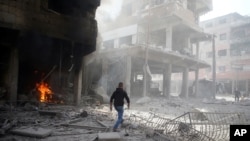The United Nations is pursuing diplomacy at the highest level to get a ceasefire in Syria, where the besieged enclave of Eastern Ghouta is at "breaking point" and Idlib governorate is a catastrophe," a senior U.N. official said on Tuesday.
Eastern Ghouta is particularly vulnerable, said Ramesh Rajasingham, U.N. deputy regional humanitarian coordinator for the Syria crisis, with 400,000 people besieged in an area that is increasingly sealed off from any outside help.
"What we would like to see is an immediate ceasefire — and I think that's very possible. We've had it before, it's not pie in the sky," Rajasingham told Reuters.
"I know that we are engaging on all fronts, at the highest level as well, to ensure that there is a ceasefire throughout Syria. If there's a will it can be done, definitely, and this is what the United Nations is pushing for in all its political initiatives."
Commenting on the situation in Eastern Ghouta, a rebel-held enclave on the outskirts of the Syrian capital Damascus, he said hundreds of patients desperately needed medical evacuation and many were dying while they waited.
"A breaking point is when people die unnecessarily, when they could be saved. So we're at that breaking point," he said.
"Catastrophe in Every Single Sense"
Rajasingham said Idlib governorate, in northwest Syria near the Turkish border, was "a catastrophe in every single sense" - humanitarian, medical, political and military.
Idlib needs a return of the ceasefire agreed last year by Russia, Turkey and Iran, which allowed hospitals to operate and people to avoid being displaced, he said.
"... We are back into a very intense conflict in an area where we thought there was actually going to be no fighting," Rajasingham added.
More than 330,000 people have been displaced in Idlib governorate since December - more than in the battle for Aleppo a year ago - taking the total number of displaced in the area to about 2 million, he said.
U.N.-led talks with the warring sides in Syria reached deadlock in December.
The mediator of the talks, Staffan de Mistura, plans to brief the U.N. Security Council on Wednesday and then meet ministers at the Munich Security Conference this weekend.
The foreign ministers of Russia, Iran and Turkey plan to meet next month to discuss the situation, Kazakh Foreign Minister Kairat Abdrakhmanov said on Tuesday.





